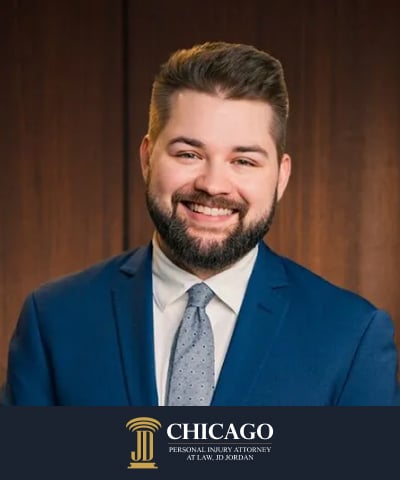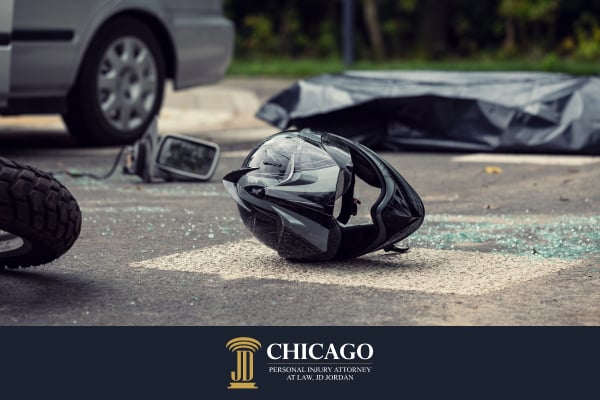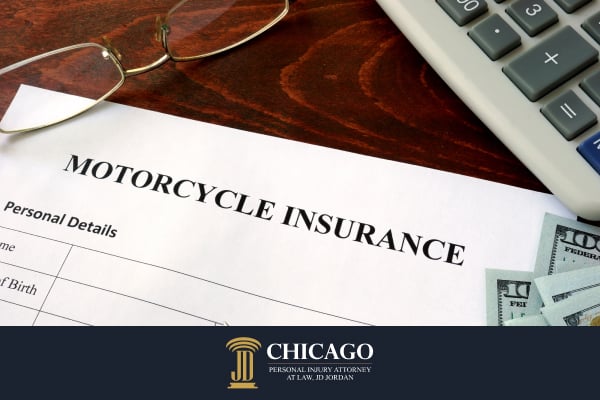


This page was written, edited, reviewed & approved by JD Jordan following our comprehensive editorial guidelines. JD Jordan, the Founding Attorney, is a Chicago-based personal injury attorney.

At Chicago Personal Injury Attorney at Law, our Chicago motorcycle accident lawyer stands up for riders who have been injured due to others' negligence on Illinois roads. We understand the unique challenges motorcycle accident victims face, from severe injuries to bias from insurance adjusters who unfairly stereotype riders. Our motorcycle accident lawyers bring years of combined experience to every case, working tirelessly to secure the compensation you need for medical bills, lost wages, and bike repairs. Let us defend your rights and pursue compensation on your behalf.
The aftermath of a motorcycle accident often leaves riders dealing with serious injuries, mounting medical expenses, and aggressive insurance company representatives who try to minimize your claim. Insurance adjusters frequently contact injured riders while they're still recovering in the hospital, hoping to secure quick statements or offer unfair settlements before victims understand the true value of their motorcycle accident claim. These early settlement offers rarely account for ongoing medical treatment, future rehabilitation needs, lost earning potential, or the physical pain and emotional distress you'll continue to experience.
Many riders don't realize that they have legal options beyond what the at-fault driver's insurance initially offers or that their own insurance may provide additional coverage through underinsured motorist protection. Our experienced attorneys thoroughly investigate every possible avenue for compensation, from defective motorcycle parts to dangerous road conditions that may have contributed to your crash. This comprehensive approach often reveals multiple liable parties who share financial responsibility for your damages, maximizing the total compensation available for your recovery.

Motorcycle accidents happen for many reasons on Chicago's busy streets, but most crashes share one common factor: the negligence of someone other than the rider.
Driver inattention ranks among the most common causes of motorcycle crashes, with car and truck drivers often claiming they "didn't see" the motorcycle before changing lanes or turning. This "looked but failed to see" phenomenon happens because many drivers don't properly scan for smaller vehicles like motorcycles, even when riders follow all safety rules. Distracted driving makes this problem worse, with drivers looking at phones, adjusting GPS systems, or talking to passengers instead of properly checking for motorcycle riders sharing the road.
Road debris creates especially dangerous conditions for motorcycle riders who lack the stability of four wheels when encountering unexpected objects in their path. Gravel, construction materials, tree branches, cargo that fell from trucks, and other debris can cause riders to lose control even at moderate speeds. Government agencies responsible for road maintenance can be held liable when they fail to clear hazardous debris within a reasonable timeframe after receiving notice of the danger.
Poor visibility conditions like rain, fog, dusk, or dawn significantly increase crash risks for motorcycle riders who already struggle with being seen by other drivers. Bad weather reduces everyone's ability to see clearly while also creating slippery road surfaces that make quick maneuvers more dangerous for riders. Nighttime riding presents additional challenges when street lighting is inadequate or when a rider's headlight isn't sufficient to illuminate potential hazards ahead.
Lane splitting occurs when riders travel between lanes of slow-moving or stopped traffic, a practice that remains controversial and technically illegal in Illinois. While some states like California have legalized this practice, Illinois drivers don't expect motorcycles to pass between lanes and may change lanes suddenly without checking these spaces. Even though lane splitting increases risk, negligent drivers who make sudden movements without signaling or checking blind spots still bear responsibility for the crashes they cause.
Sudden left turns by cars across the path of oncoming motorcycles cause a large percentage of serious motorcycle collisions at intersections throughout Chicago. Drivers misjudge the speed of approaching motorcycles or simply fail to notice them before turning left across their path without yielding the right-of-way. These T-bone or broadside collisions often happen at full speed since riders have little time to brake, resulting in catastrophic injuries when riders impact the side of the turning vehicle or get thrown from their bikes.
Drunk driving remains a persistent danger to everyone on Chicago roads, but motorcyclists suffer disproportionately severe consequences when struck by impaired drivers. Alcohol and drugs severely impair critical driving skills, including judgment, reaction time, and visual scanning that helps drivers notice smaller vehicles like motorcycles. Accidents involving drunk drivers often justify claims for punitive damages beyond regular compensation, holding intoxicated drivers financially accountable for their reckless decision to drive while impaired.

Unlike car occupants who have seat belts, airbags, and a protective metal frame surrounding them, motorcycle riders have only their helmets and riding gear to absorb impact forces in a crash. This fundamental lack of protection means that even relatively low-speed collisions can result in catastrophic injuries or death for riders. The physics of motorcycle crashes work against riders, who often experience two impacts – first, when their bike collides with another vehicle or object, and then when their body strikes the pavement, guardrail, or other surface.
Medical expenses for motorcycle crash victims typically far exceed those of car accident victims due to the severity of injuries and longer recovery periods required. Many riders face multiple surgeries, extended hospital stays, and months or years of rehabilitation before reaching maximum medical improvement. The financial impact extends beyond immediate medical bills to include lost wages during recovery, reduced earning capacity if injuries prevent returning to previous employment, and significant lifestyle changes that may require home modifications or ongoing assistance with daily activities.

Motorcycle riders often face unfair prejudice from insurance adjusters, jurors, and even some judges who hold stereotypical views of motorcyclists as reckless thrill-seekers. This bias can significantly impact how fault is assigned in accident cases and how much compensation riders receive for their injuries. Our motorcycle accident lawyers actively work to counter these stereotypes by presenting our clients as the responsible individuals they are. We emphasize the safety gear used, riding experience, and defensive driving techniques employed before the crash occurred.
The "assumption of risk" argument frequently emerges in motorcycle accident cases, with defense attorneys suggesting that riders knowingly accept greater danger simply by choosing to ride. Illinois law clearly rejects this notion, affirming that motorcycle riders have the same rights to safe road conditions and careful behavior from other drivers as anyone else using public roadways.
Yes, you can still pursue compensation even if you weren't wearing a helmet at the time of your accident. Illinois does not have a mandatory helmet law for adult riders, so not wearing one cannot be used as evidence of negligence, though defense attorneys may try to argue that your injuries would have been less severe with a helmet.
Illinois follows a "modified comparative negligence" rule that allows you to recover damages as long as you were less than 51% responsible for the crash. Your compensation will be reduced by your percentage of fault, making it crucial to have skilled legal representation that can minimize any blame assigned to you.
Yes, you can file claims against government agencies responsible for road maintenance if dangerous conditions like potholes, missing signs, or malfunctioning traffic signals contributed to your accident. These cases involve special rules and shorter deadlines, usually requiring notices of claim within one year, compared to the standard two-year statute of limitations.
If you were injured by a hit-and-run driver, you can still seek compensation through your own uninsured motorist coverage. Our law firm uses various investigative techniques to identify fleeing drivers, including checking nearby surveillance cameras, locating witnesses, and working with police to find the responsible party.
Most medical providers will treat you on a lien basis, meaning they agree to wait for payment until your case settles, while your health insurance may cover initial treatments. For motorcycle repairs, your collision coverage should be paid upfront if you have it, or we can help arrange repairs with shops that will wait for settlement before requiring payment.

Chicago Personal Injury Attorney at Law is prepared to defend your rights and seek maximum compensation. Our Chicago motorcycle accident lawyers have extensive experience countering bias against riders while building compelling cases that document the full extent of your losses. Contact us today to schedule a free case consultation with our motorcycle accident attorney.


JD Jordan, a Chicago personal injury attorney, understands client needs firsthand. A serious car accident in his youth, where he witnessed aggressive defense and the value of a supportive attorney, inspired his career. He has since helped clients recover nearly $100 million, recognized for his steady, strategic approach and ability to connect with those facing difficult circumstances.